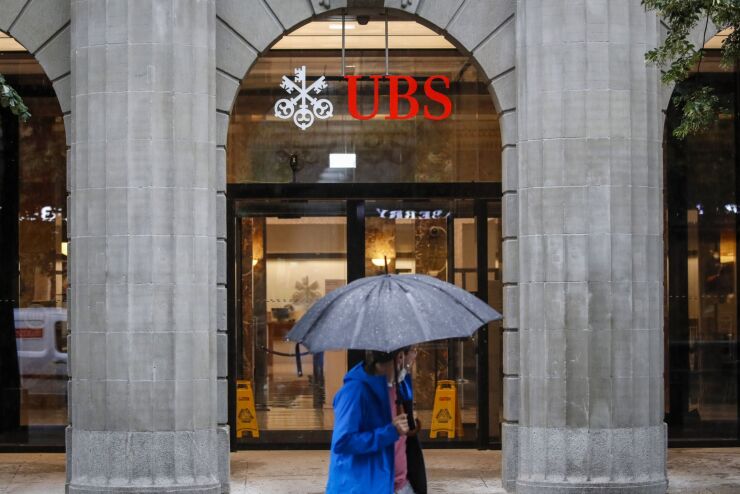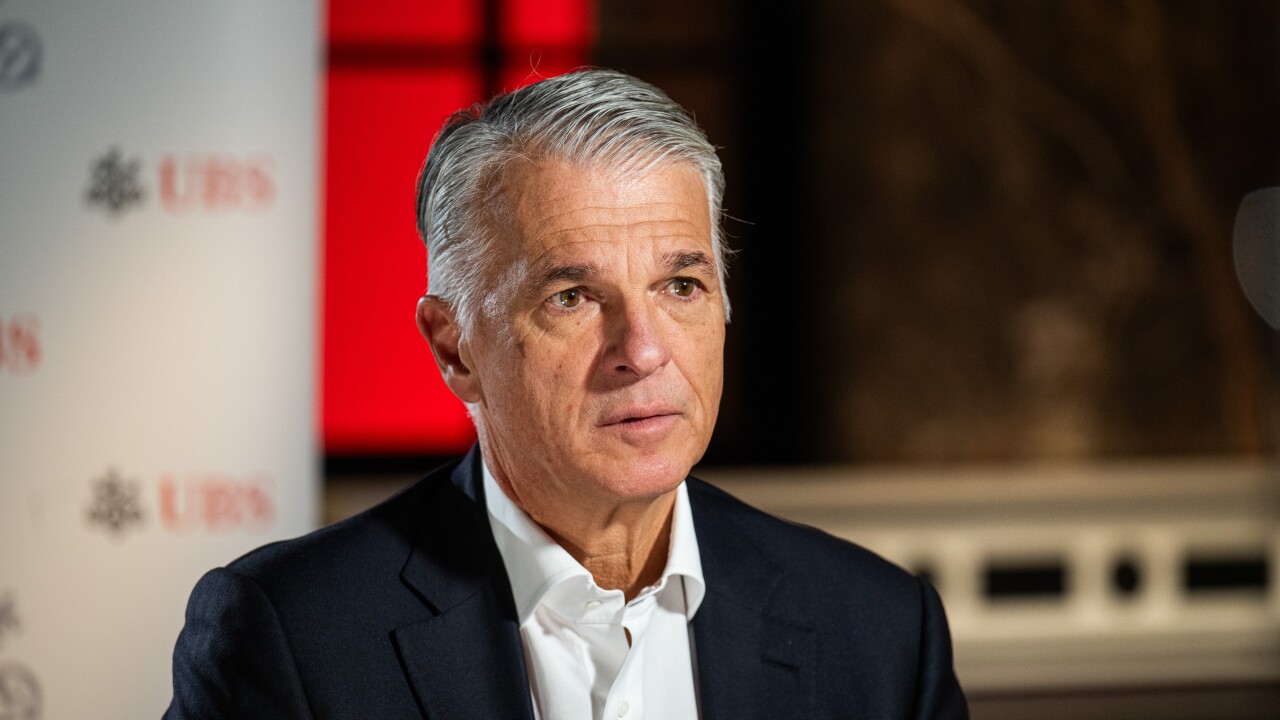After UBS resolved client complaints amounting to billions in alleged losses from funds tied to Puerto Rican bonds, its brokers are getting many of the thousands of claims off their records.
As part of
With a federal oversight board, government agencies in Puerto Rico and other parties entering mediation
“Each department [of a firm] has an equally significant role in the investor protection process when it comes to selling proprietary products,” Malecki Law attorney Jenice Malecki said in an emailed statement. She has represented about a dozen brokers in cases with monetary damages resolved to the satisfaction of the parties in recent years.
“If any one of those roles fails, though, the weight of the problem always falls on the retail financial professional, because they alone have it reflected on their CRD/BrokerCheck,” Malecki said. “It can be career-ending. These issues are not ‘black and white.’ It is naïve to think all brokers seeking expungement are bad and gaming the system and all investors and regulators are always correct. The system simply needs work, for investors and industry participants alike.”
Representatives for UBS, which supported the advisors’ requests for expungement in every one of the cases during the two-week span last month, declined to comment.
Resolved and ongoing cases
In 2015, UBS agreed to
Beyond those matters, the firm still faces a derivative action filed against UBS Puerto Rico and more than 40 other defendants on behalf of public employees’ retirement plan, the annual report states. The firm won dismissal of three cases filed by U.S. insurers against UBS and other underwriters of the municipal bonds seeking a combined $955 million, but it faces appeals of those dismissals in at least two of the disputes, the annual report states. Lastly, UBS could pay back up to $125 million in underwriting and swap fees under cases filed by the oversight board.
“As in the case of other matters for which we have established provisions, the future outflow of resources in respect of such matters cannot be determined with certainty based on currently available information and accordingly may ultimately prove to be substantially greater (or may be less) than the provisions that we have recognized,” the annual report states.
Regardless of the slew of cases in the wake of Puerto Rico’s insolvency, many critics argue that the firm and key
That ex-banker, Jose G. Ramirez Arone Jr., told Financial Planning’s sister publication,
“This is the most ungrateful business on the face of the Earth,” Ramirez told The Bond Buyer. “My clients that hated me so much, that used to make $300,000, $250,000 a month tax-exempt on their investments, said that I misled them.”

Checking BrokerCheck
Another less-frequently discussed aspect of the saga revolves around the vast amounts of client complaints disclosed prominently with the big red marks on BrokerCheck for all of the advisors whose clients invested in the products. They form a notable contrast with the disclosures buried deep in the detailed BrokerCheck files of UBS brokerage entities without any comprehensive tracking of the complaints filed by the same clients.
“Brokerage firms are not required to report arbitration claims filed against them by customers,” according to boilerplate language on page 60 of the detailed
UBS Puerto Rico’s record contains a mere 43 disclosures of arbitration cases, while that of the wirehouse’s main brokerage, UBS Financial Services, has 424 for its entire 50-year history. Meanwhile, UBS advisor Ángel Manuel Canabal displays 96 client complaints on
The attorney who represented Manuel Canabal, a 30-year industry veteran, didn’t respond to requests for comment.
“Brokers need a special process in product cases to assess, en masse, whether reporting on their CRD is appropriate or warranted. Instead, they are all left to costly, time-consuming and lengthy individual actions,” Malecki said. “As has always been my opinion with the Puerto Rico closed-end bond funds, there were not only structuring defects and misrepresentations or omissions to the public, but to the salesforce — who themselves often bought it for their own families, friends and neighbors.”
FINRA
“If you win an arbitration award against an individual or a firm, it will appear on the respondent’s BrokerCheck record. Whether it appears on a firm’s or a broker’s record depends on who the respondent is,” he said.
“Firms are required to complete and update Form BD — an SEC form — which does not require disclosure of customer complaints,” Pellecchia said. “That is the basis for what appears on BrokerCheck about firms (we also add arbitration awards). Disclosures for individuals are made through Forms U4 and U5, which do require disclosure of customer complaints. Forms U4 and U5 are administered by FINRA and state regulators (the latter represented by NASAA), and any changes in the forms are subject to the SEC’s review and approval.”
Representatives for the SEC declined a request for comment.
Passing the buck
An attorney who has represented hundreds of investors seeking damages for their losses, Jeff Sonn of the Sonn Law Group, remains “very frustrated” that regulators didn’t file a successful case against a former chairman of UBS Puerto Rico who was caught on a 2011 tape
“It was not a secret to financial professionals that sold bonds that the Puerto Rico government was in trouble,” he said. “Analysts had published research a year before recommending that investors limit their exposure to just 10% of the portfolio, and in almost all cases, that sage advice was ignored. So while the financial advisors feel wronged, and maybe they were
cajoled into selling proprietary funds and bonds where UBS was the manager, the underwriter, the accountant, the lead selling agent etc., the advisors still ignored the fundamental rule to not put too many eggs in one basket.”
None of the clients whose 29 complaints will be expunged under the half dozen awards from last month participated in the hearings, a common complaint among opponents calling for
“One of the fundamental recommendations that [he] made to each of his customers was that they own diversified portfolios, meaning that their accounts would not be concentrated in one particular type or class of securities or in a specific geographical area (e.g., Puerto Rico vs. United States),” the panelists wrote. “Any wrongdoing the customers alleged against him in these 10 underlying actions, including that [he] recommended unsuitable investments or hid material information about the risks involved with those investments, is factually impossible, clearly erroneous and false.”
Out of the seven brokers winning the six recent awards handed down by panels in San Juan, all remain with UBS as well. Another one of them, Jose David Mendez Perez, won expungement of nine complaints out of 35 on his
If the advisors “sold concentrated positions in the bonds and funds,” then they breached their fiduciary duty and the complaints should remain on their Central Registration Depository records, according to Sonn.
“In fairness, all these financial advisors should have sued the highest levels of UBS Puerto Rico management if they felt misled about the relative safety of the funds and bonds,” he said. “Some did and received settlements; some did not. But a CRD expungement should be reserved for those cases where the advisor was truly not involved in the sales practice violation at issue; here, they were, for better or worse.”
On the other hand, FINRA and the SEC “come down harder on individuals and small firms in regulatory and enforcement cases” than against the giants, according to Malecki. Many of the UBS advisors “would not intentionally cause harm and nor were they negligent,” she said.
“In my opinion, it was a recipe for disaster from the top, a recipe that has been used by many firms historically and will likely be used again — because meager accountability is worth the price. Regulators often take advantage of the weaker players in the system, the easy, low road, and let most of the problem fall on the shoulders of individual brokers,” Malecki said. “Tell me, isn’t that really why these types of issues happen every few years?”










